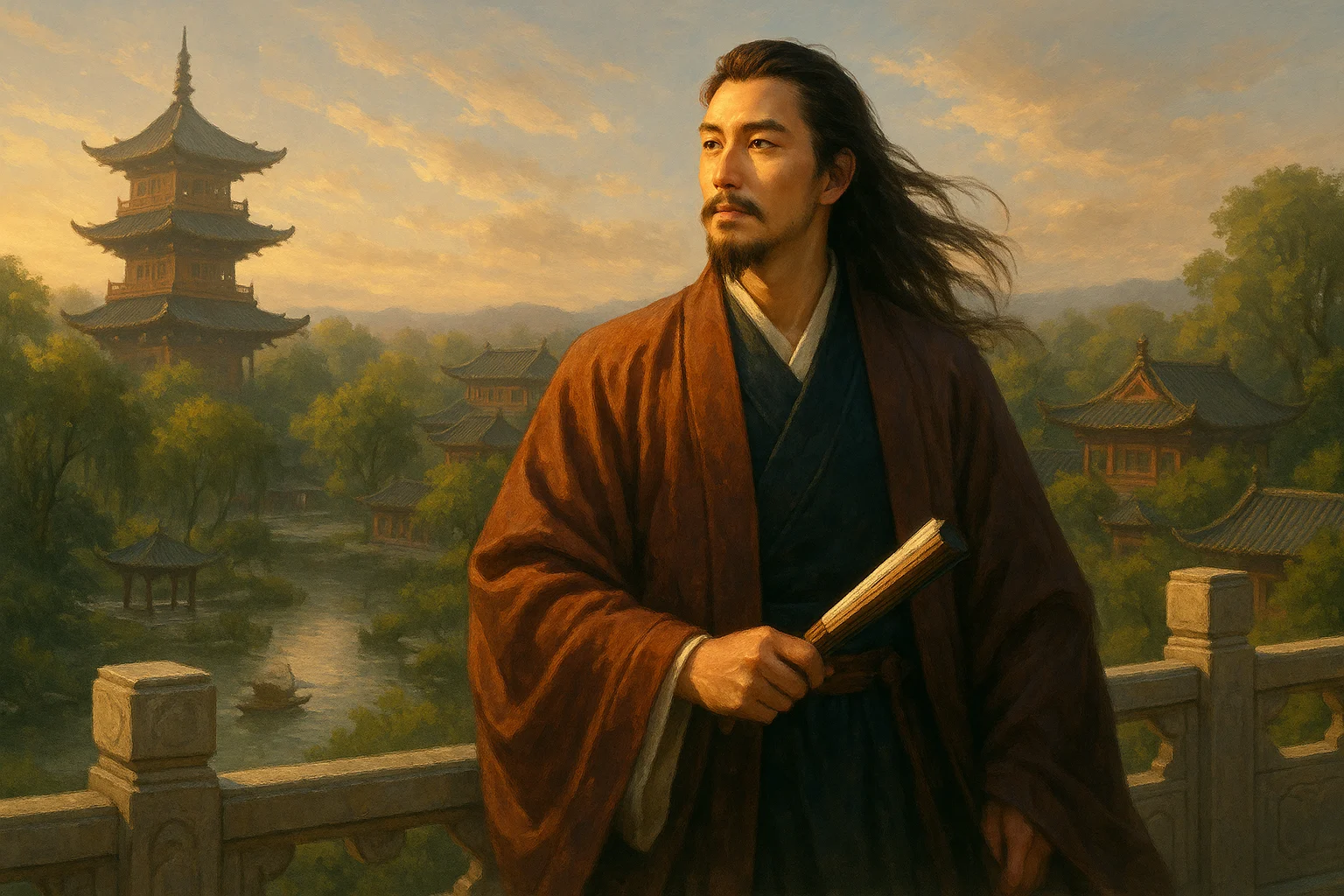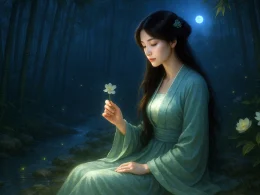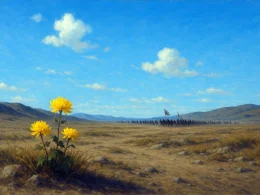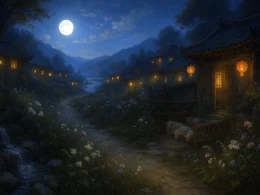Lonely anvils in detached halls,
Desolate horns paint fortress walls—
Autumn's sonic wave floods the void.
Swallows short-sell the eastern sea,
Geese go long on southern sand's IPO.
Chu's terrace wind, Yu's tower moon—still in cache,
As if debugged yesterday.
Trapped in fame's firewall,
Held by love's deadlock—how banal!
My charm lies idle in recycle bin.
Vows carved on marble stele now corrupt,
Qin Tower's date missed by profit interrupt.
When dreams hit shutdown,
Soberness boots up,
The system processes regret.exe.
Original Poem
「千秋岁引 · 秋景」
别馆寒砧,孤城画角,一派秋声入寥廓。
东归燕从海上去,南来雁向沙头落。
楚台风,庾楼月,宛如昨。无奈被些名利缚,无奈被它情担阁!可惜风流总闲却!
王安石
当初漫留华表语,而今误我秦楼约。
梦阑时,酒醒后,思量着。
Interpretation
This lyric was likely composed during Wang Anshi's later years after retiring to Jinling (present-day Nanjing) following his resignation as chancellor. Having served twice as prime minister and spearheaded reform efforts that ultimately faltered amid political opposition, Wang retreated to Zhong Mountain, where his poetry reflected complex emotions - lamenting unfulfilled ambitions while distancing himself from worldly fame and fortune. This work, representative of his later style, masterfully blends scene and sentiment, reality and illusion, expressing nostalgia for bygone days while contemplating the constraints of reputation and the essence of true freedom.
First Stanza: "别馆寒砧,孤城画角,一派秋声入寥廓。东归燕从海上去,南来雁向沙头落。楚台风,庾楼月,宛如昨。"
Bié guǎn hán zhēn, gū chéng huà jiǎo, yī pài qiū shēng rù liáokuò. Dōng guī yàn cóng hǎi shàng qù, nán lái yàn xiàng shā tóu luò. Chǔ tái fēng, Yǔ lóu yuè, wǎn rú zuó.
In this lodge, cold pounding of laundry mallets; the lone city's painted horn - / All autumn's voices merge into the vast forlorn. / Eastbound swallows vanish where sea winds are borne; / Southcoming geese on sandy isles alight at morn. / The Chu Terrace breeze, / Yu Tower's moon - / Each seems reborn.
The opening stanza paints an autumn scene. "Cold pounding" of laundry and the "painted horn" establish a melancholic atmosphere of travel and separation. "All autumn's voices" expands the imagery into a boundless, ethereal realm. The swallows and geese, both realistic details and emotional symbols, trigger nostalgia. "Chu Terrace breeze" and "Yu Tower's moon" allude to historical sites associated with literary gatherings, suggesting the poet's remembrance of past glories now existing only in memory "reborn" through nature's constancy.
Second Stanza: "无奈被些名利缚,无奈被它情担阁!可惜风流总闲却!当初漫留华表语,而今误我秦楼约。梦阑时,酒醒后,思量着。"
Wúnài bèi xiē mínglì fù, wúnài bèi tā qíng dān gé! Kěxī fēngliú zǒng xián què! Dāngchū màn liú huábiǎo yǔ, érjīn wù wǒ qín lóu yuē. Mèng lán shí, jiǔ xǐng hòu, sīliang zhe.
Ah, trapped by fame's vain chains, / And love's distracting pains! / My finest hours wasted in mundane lanes! / Those immortal vows at marble pillar made, / Now make me miss my rosy-tower parade. / When dreams dissolve, / When wine's solved, / Only these thoughts remain.
Transitioning to lament, the stanza opens with twin "ah"s emphasizing helplessness against worldly attachments. "Finest hours wasted" implies suppressed ideals, while "immortal vows" references the legend of Ding Lingwei, whose crane transformation symbolized transcendent aspirations now contrasting with broken "rosy-tower" promises - metaphors for political ideals versus reality. The closing trinity - "dreams dissolve", "wine's solved", "thoughts remain" - completes an emotional arc: temporary escapes yielding to persistent reflection, leaving readers with resonant melancholy. The entire work embodies Wang's late style where political disillusionment transforms into philosophical depth through nature's prism.
Holistic Appreciation
This poem is a quintessential late-life self-portrait, capturing Wang Anshi's sense of "awakening" after the vicissitudes of officialdom—regretful of fame's entanglements yet wistful for irretrievable elegance. The first stanza depicts autumn sounds, fleeting birds, clear winds, and bright moonlight, all imbued with life's flavors; the second stanza expresses profound, unconventional emotions tinged with philosophical reflection. The language blends gentleness with steely resolve, tenderness with sharp insight, lamenting life's disappointments while offering clear-eyed retrospection after the "dream" has broken.
Notably, though the poem employs romantic imagery, it primarily uses the "fragrant herb and fair lady" (香草美人) allegorical tradition to convey personal history. Symbols like the huabiao (华表, imperial admonitory pillar) and qinlou (秦楼, pleasure pavilion) metaphorically express deep remorse for career missteps and life's misdirections, revealing the poem's far-reaching artistic realm and subtle emotional depths.
Artistic Merits
- Scene-Emotion Fusion, Blending Real and Ideal
Autumn night travel scenes merge flawlessly with inner sentiment—emotion born from scenery, scenery animated by feeling—creating an ethereal, profound atmosphere. - Allusive Mastery, Philosophical Depth
Allusions like "Chu palace breezes" (楚台风) and "Yu tower moon" (庾楼月) appear effortless yet enrich the poem's intellectual and emotional weight. - Precise Structure, Organic Flow
The first stanza paints scenery; the second voices emotion, progressing outward to inward, scene to feeling. Dreams and wine conclude the poem, leaving meaning reverberating without dispersion, emotion submerged yet lingering. - Plain Language, Profound Meaning
Simple, unadorned diction carries rich inner turmoil—from neglected elegance to dreams and wine, each step bears emotional weight, every word pulses with feeling.
Insights
This poem starkly reveals life's dilemmas of "gain and loss" and "advance and retreat," expressing the poet's post-career introspection and self-liberation. In modern society, everyone faces varying degrees of "career entrapment" or "emotional baggage." Wang Anshi's calm portrayal of this struggle and awakening embodies wisdom born of reason and emotion intertwined. The line "When dreams end, after sobering from wine, I ponder" (梦阑时,酒醒后,思量着) serves as a reminder: after life's tumult, we must still quiet our minds to reflect on true desires, awakening from dreams to walk a clearer path forward.
About the Poet

Wang Anshi (王安石 1021 - 1086), a native of Linchuan in Jiangxi, was an outstanding statesman, writer, and thinker of the Northern Song Dynasty, counted among the "Eight Great Prose Masters of the Tang and Song Dynasties." His poetic achievements were particularly profound—his early works, filled with heroic language, revealed the ambition of a reformer. Though his ci poetry was few in number, it pioneered new realms of historical reflection. His poetry and prose combined intellectual depth with artistic value, and the over 1,500 works preserved in The Collected Works of Linchuan stand as a monumental testament to literary innovation in Song Dynasty literature.












